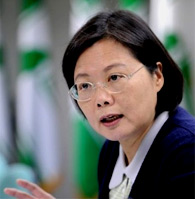Earlier this month, Fridae reported that presidential hopeful and chairperson of the main opposition Democratic Progressive Party (DPP) Tsai Ing-wen (蔡英文) was asked by one of her predecessors – ex-DPP chairman Shih Ming-teh (施明德) to clarify her sexual orientation. The move is widely perceived to be an attempt to sabotage Tsai who is said to be the frontrunner in a three-way primary for the DPP nomination for the 2012 presidential election. Fan Yun, a board member of the Awakening Foundation and an associate professor of sociology at National Taiwan University, discussed the issue in The Taipei Times on April 22, 2011:
Does a presidential candidate have to reveal their sexual orientation to the public?

The question has suddenly become a hot topic in Taiwan. Although women’s groups and gay and lesbian groups were quick to respond after former Democratic Progressive Party (DPP) chairman Shih Ming-teh (施明德) questioned DPP presidential primary contender Tsai Ing-wen’s (蔡英文) sexuality, the media’s interest in the subject has not yet been sated. On Friday morning, UFO Radio (飛碟電台) host Tang Hsiang-lung (唐湘龍) devoted 30 minutes of his program to listeners’ calls on the topic of whether Tsai should come out of the closet or else clarify that she is not in fact a lesbian.
Should politicians have to declare their sexual orientation, just as they have to declare their assets? Shih seems to think so, but we really ought to consider what influence or harm someone’s sexual orientation or how faithful they are in their love life might have on how they go about making policy. Although experience tells us that politics is dominated by heterosexual men and that they have a tendency to make public policy decisions that infringe on the rights of minorities, the democratic consensus in most countries, including the US, is that the private lives of public figures should not be a focus of examination and discussion by the public at large.
The questions now being raised about Tsai’s private life are not an isolated phenomenon. In Taiwan, curiosity about public figures’ private lives tends to focus on women.
Female politicians whose lives have been put under a microscope include former vice president Annette Lu (呂秀蓮), former president Chen Shui-bian’s (陳水扁) former interpreter Hsiao Bi-khim (蕭美琴), former Hsinchu City Bureau of Cultural Affairs director Chu Mei-feng (璩美鳳) and independent legislator May Chin (高金素梅). These and many other examples illustrate how the private lives of women politicians, especially unmarried ones, are so often picked over by the media and public.
Even when the woman in question refuses to be drawn by rumors, incessant reporting and discussion in the media detract from her right to freely participate in politics. In addition to still being a minority in the world of politics, the professional image and hard work of these women are overlooked, putting them on an unequal footing with male colleagues.
Taiwanese society has not yet grasped the proper standards and limits of public discussion, and the media have yet to learn where to draw the line between what is public and what should remain private. Think about it. If someone in your workplace asked questions about your sexual orientation in front of everyone, no matter whether you are gay or straight and whether or not you admit to whatever that person implies, your career prospects and indeed your space for social interaction may well suffer as a result, given that our society is still full of prejudice against homosexuality in both language and culture.
If that is true in the workplace, then it is even more so in the heat of elections, when the power to govern the country is at stake.
An enlightened society needs to continue learning and evolving its standards of conduct. Any media outlet that aspires to be considered of good quality should desist from reporting speculation about politicians’ private lives, and all worthy citizens should refrain from spreading stories about other people’s love lives and private affairs, except when the people concerned divulge the information of their own accord.
Fan Yun is a board member of the Awakening Foundation and an associate professor of sociology at National Taiwan University. The column was first published in The Taipei Times on April 22, 2011 and is republished with permission from the author.











 列印版本
列印版本











讀者回應
Makes one feel that she should come clean one way or the other and maybe they'd shut up, and the focus would be shifted. She must have her opponents running a bit scared over policy if they want to mischief-make over something unrelated to the running of the country.
It is understandable to want a certain degree of privacy in all our lives and in this case what is a very public role. An individuals choice should be respected.
If we trust people in positions of power or profession, their sexuality should be of no consequence.
question to 'Kellen'#2: I am curious to why you would be worried if a political leader was unwilling to state their marital status. ? :)
But authenticity is rare in politicians and trolls.
When it's their turn to declare themselves, that's when you will hear the howling and defensiveness....
With regards to personal life, politician his/herself must know the balance point. All these rumours raise prove Sexual Orientation still a controversy issue. That's it.
請先登入再使用此功能。